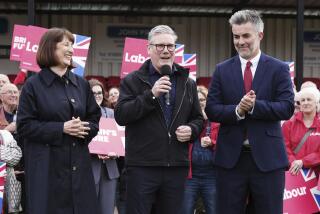Voters Dissent on Thatcher Anniversary
LONDON — Voters in England and Wales appear to have celebrated Prime Minister Margaret Thatcher’s 10th anniversary in office Thursday with warning shots across her Conservative Party’s bow.
British Broadcasting Corp. television projected a “stunning” victory for the opposition Labor Party in a special parliamentary by-election in the Vale of Glamorgan in south Wales.
While the actual vote will not be counted until this morning, a BBC exit poll indicated that Labor Party candidate John Smith won 51% of the vote against 35% for his Conservative opponent, Rod Richards. While Labor had been expected to win the by-election, the margin of victory suggested by the BBC was substantially greater than indicated in earlier polls.
Smith described his apparent victory in a constituency that had been held by the Conservatives for 38 years as “a rejection of Mrs. Thatcher by the country.”
“I actually now believe that Mrs. Thatcher’s days are numbered,” he added.
Labor also appeared to be making gains in local council elections held Thursday in 47 rural areas of England and Wales that are the traditional heartland of Conservative support.
In the local balloting, however, Labor’s gains apparently came at the expense of centrist parties that had been at the height of their power during the last county council elections in 1985. The Conservatives, drawing from that same pool of former centrist support, were expected to make even larger gains than Labor in the local elections, leaving analysts to argue about which side’s improvement was the more significant as a guide to national sentiment.
Thatcher aides downplayed the importance of Thursday’s balloting, arguing that governments here always show up relatively weaker midway through their term of office. Thatcher, who became Britain’s first woman prime minister on May 4, 1979, was elected to a third term in 1987.
‘Real Special Effort’
If Thatcher was concerned about her political future, she gave no sign of it during low-key anniversary celebrations. Now the longest-serving British prime minister this century and the third longest-serving of all time, Thatcher likened herself during an anniversary interview with Britain’s domestic news agency, the Press Assn., to a “tigress” defending her homeland against the evils of socialism that had threatened to destroy it.
Looking ahead, she told reporters outside her official residence at No. 10 Downing St.: “It’s going to be very exciting in the next 10 years coming up to the millennium and we want to make a real special effort to see that everything is better then than it is now.”
Asked if she planned to lead Britain into the next century, she replied, “We just carry on and take each day as it comes and do the very best we can, always planning for the future.”
Thatcher and her businessman husband, Denis, were feted at a Cabinet dinner in her honor Thursday night. The toasts were reportedly drunk with 1979 vintage wine. Polls assessing Thatcher’s performance over the last decade show that the British public respects her determination but dislikes her personally and worries that she is taking her anti-socialist revolution too far.
In the Vale of Glamorgan, for example, where the by-election was called to fill the House of Commons seat of the late Conservative, Raymond Gower, Thatcher’s controversial plan to reform Britain’s National Health Service was the dominant issue. About 150 Glamorgan doctors crisscrossed the constituency during the campaign, urging a “No Tory” vote in protest over the government’s health proposals.
Britons fear that the Thatcher reforms are a prelude to the dismantling of the National Health Service in favor of private medicine, and public opinion surveys have consistently shown it to be one of the most unpopular moves of her decade in office.
More to Read
Sign up for Essential California
The most important California stories and recommendations in your inbox every morning.
You may occasionally receive promotional content from the Los Angeles Times.










